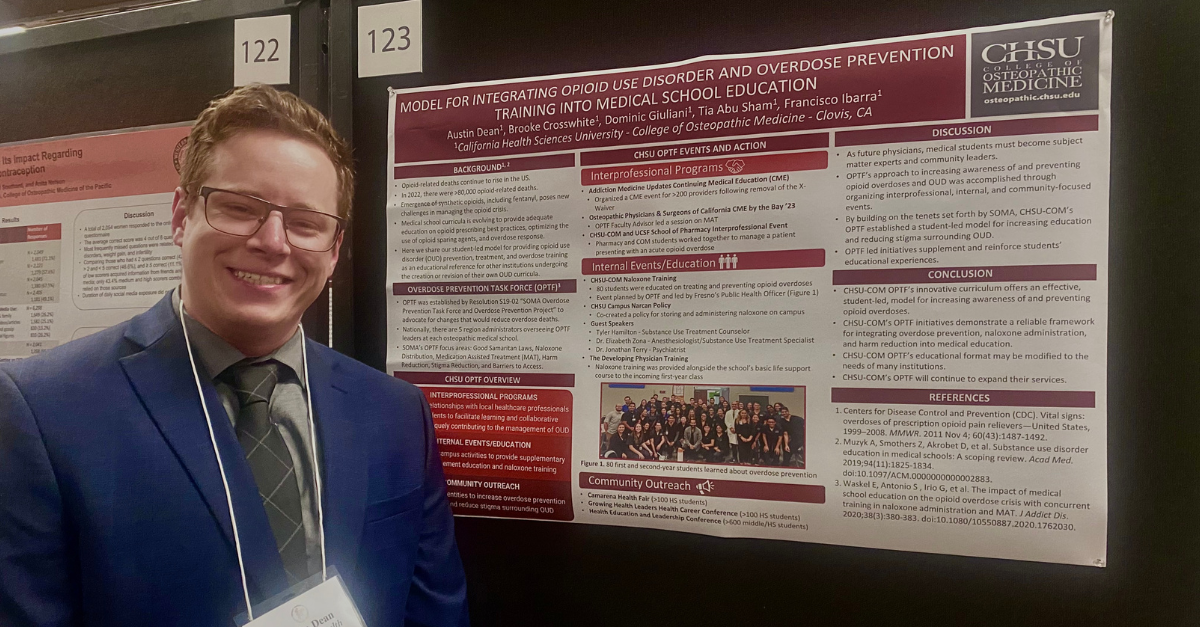CHSU Medical Student Presents a Poster at the Western Medical Research Conference
January 31, 2024

By Austin Dean, third-year medical student
Austin Dean, third-year medical student, attended the 2024 Western Medical Research Conference (WMRC) in Carmel, California in January 2024 to present his group’s research project titled “Model for Integrating Opioid Use Disorder and Overdose Prevention Training into Medical School Education.” The Western Students and Resident Medical Research Forum is designed with a special focus on medical students and residents with the intention to provide learners with an opportunity to present their research in a formal, yet relaxing environment.
Understanding that substance use is a complex public health crisis that necessitates a multifaceted approach, Austin Dean, third-year medical student, and his team have the goal to expand the impact that the Overdose Prevention Task Force (OPTF) has to save lives beyond California Health Sciences University College of Osteopathic Medicine’s (CHSU-COM).
Dean’s team research reviewed the OPTF model from CHSU-COM for managing opioid use disorder and leading community-centered initiatives. The model was shared as an educational reference for other institutions undergoing the creation or revision of their own substance use programs and curricula.
At the WMRC, Dean seized the opportunity to disseminate their research findings and engage in meaningfulwith fellow students and esteemed physicians from diverse regions of the United States and Canada.
“The discussions not only encompassed the accomplishments of my team’s research but provided a platform for insightful exchanges related to the challenges and obstacles encountered,” said Dean. “These conversations offered diverse perspectives on overcoming impediments and brought to light the unique difficulties students face as a result of their respective states’ political landscape.”
For Dean, his strong pursuit to being involved in OPTF stemmed from witnessing close friends and loved ones grappling with chronic substance use, including the tragic loss of his father to an overdose. He was also exposed to the sheer number of individuals affected by this crisis as an undergraduate in the needle exchange program and while working at a local emergency department.
“Living through these experiences painted a stark picture of the pervasive nature of substance use, particularly in the Fresno community,” shared Dean. “An indelible mark was left on me, as I realized that there is a glaring deficiency in both support and preventative measures to safeguard these vulnerable individuals. It was in response to this pressing need that I became involved with the OPTF at CHSU-COM.”
Being involved with this task force has allowed Dean and his dedicated team members to establish a solid foundation for this initiative. They have taken substantial steps towards its integration into the medical school education at CHSU-COM.
“Through the development of informative lectures and facilitating naloxone certification for our peers, we are equipping the next generation of healthcare professionals with essential knowledge and skills to address the critical issue of substance use,” said Dean. “Our team is steadily growing, and with additional support, we aspire to expand our reach into the broader community.”
The research abstract was published in The Journal of Investigative Medicine (doi:10.1177/10815589231218540).
#286 Yusuf F, Sharma A, Crosswhite B, Giuliani D, Abusham T, Dean A, Ibarra F.